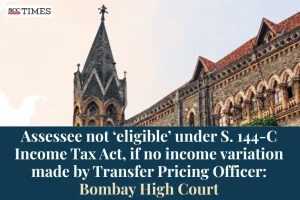Bombay High Court: In the writ petition challenging Draft and Final Assessment Order passed under Section 144-C of the Income Tax Act, 1961(‘IT Act’) on the ground that the petitioner did not fall under the category of ‘eligible assessee’ under the said provision, as no income variation was made by the Transfer Pricing Officer (‘TPO’) in its order, the Division Bench of B. P. Colabawalla* and Amit S. Jamsandekar, JJ., stated that petitioner could be an ‘eligible assessee’ only if there was a case of variation which had arisen because of the order passed by the TPO. The Court stated that when there was no variation, there was no question of any prejudice being caused to the assessee which would then entail him to file any objections to the Draft Order as contemplated under Section 144-C(2) of IT Act. Therefore, the order passed was invalid. Hence, the Court quashed and set aside the Draft Assessment Order, the Final Assessment Order and the Demand Notice as well as the Show Cause Notices which sought to impose penalty on the petitioner.
Background
The Assessing Officer had made a reference to the TPO under Section 92-CA of the IT Act against the petitioner, which was a foreign company. Pursuant to this reference, the TPO issued notices to the petitioner and thereafter passed an order under Section 92-CA(3) of the IT Act accepting that the international transactions entered by the petitioner with its Associated Enterprises were at an Arms Length Price i.e., TPO made no variation.
The petitioner contended that by virtue of the definition of the words “eligible assessee” appearing in Section 144-C(15) of the IT Act, the petitioner could not fall within the aforesaid definition because the TPO never made any variation. Since no variation was made, the Assessing Officer had no authority to pass any Draft Assessment Order. Thus, the petitioner claimed that the Assessing Officer ought to have passed his Assessment Order under Section 143(3) of IT Act without invoking the provisions of Section 144-C of the IT Act.
On the other hand, the Revenue department contended that no variation did not mean that the Assessing Officer was powerless to issue a Draft Assessment Order under Section 144-C of IT Act. It was further stated that a broad meaning was given to the “eligible assessee” in the IT Act and it included all Assessees where a reference to the TPO was made by the Assessing Officer proposing a variation to the income declared by the Assessee. Further, as the meaning of income included loss, similar meaning of “variation” would also include “no variation” by the TPO.
Therefore, the petitioner filed a writ petition seeking to quash and set aside the Draft Assessment Order passed under Section 144-C and the Final Assessment Order passed under Section 143(3) read with Section 144-C and Section 144-B of the IT Act.
Analysis, Law and Decision
The Court observed that the issue before it was whether petitioner was an “eligible assessee” as per the provisions of the IT Act.
The Court noted that it was undisputed, that the petitioner was a non-resident or a foreign company as per Section 144-C (15)(b)(ii) of IT Act. The petitioner could be an “eligible assessee” only if there was a case of variation which had arisen because of the order passed by the TPO under of Section 92-CA(3) of IT Act.
The Court pointed out that in the instant case there was no variation in the income of the petitioner by virtue of the order of the TPO, therefore, the petitioner could not be an “eligible assessee” as defined in Section 144-C(15)(i) of the IT Act. The Court opined that Section 144-C(1) of IT Act itself categorically stated that the Assessing Officer would have to forward a draft assessment order to the “eligible assesee”, if he proposes to make, on or after 1-10-2009, any variation which would be prejudicial to the interest of such Assessee. When there was no variation, there was no question of any prejudice being caused to the Assessee which would then entail him to file any objections to the Draft Order as contemplated under Section 144-C(2) of IT Act. Therefore, the contention of the revenue department was not justified.
Accordingly, the Court held that the petitioner was not an “eligible assessee” in terms of Section 144-C15(b) of the IT Act. The Assessing Officer was not competent to pass the Draft Assessment Order under Section 144-C(1) of the IT Act as a draft order could only be issued when the Assessing Officer proposes variations adverse to the assessee, and no such variation existed as the TPO had accepted the international transactions. Consequently, the Assessing Officer could not pass a Final Assessment Order under Section 143 (3) read with Section 144-C (3) read with Section 144-B of the IT Act. Hence, the Court quashed and set aside the Draft Assessment Order, the Final Assessment Order and the Demand Notice as well as the Show Cause Notices which sought to impose penalty on the petitioner.
[Classic Legends Pvt Ltd v. CIT, 2025 SCC OnLine Bom 3331, decided on: 9-9-2025]
*Judgement authored by- Justice B. P. Colabawalla
Advocates who appeared in this case:
Advocate for the Petitioners- Jehangir D. Mistry, Senior Advocate; Devendra Jain, Shashank Mehta i/b Kashyap Chothani
Advocate for the Respondents- Akhileshwar Sharma, Advocate

